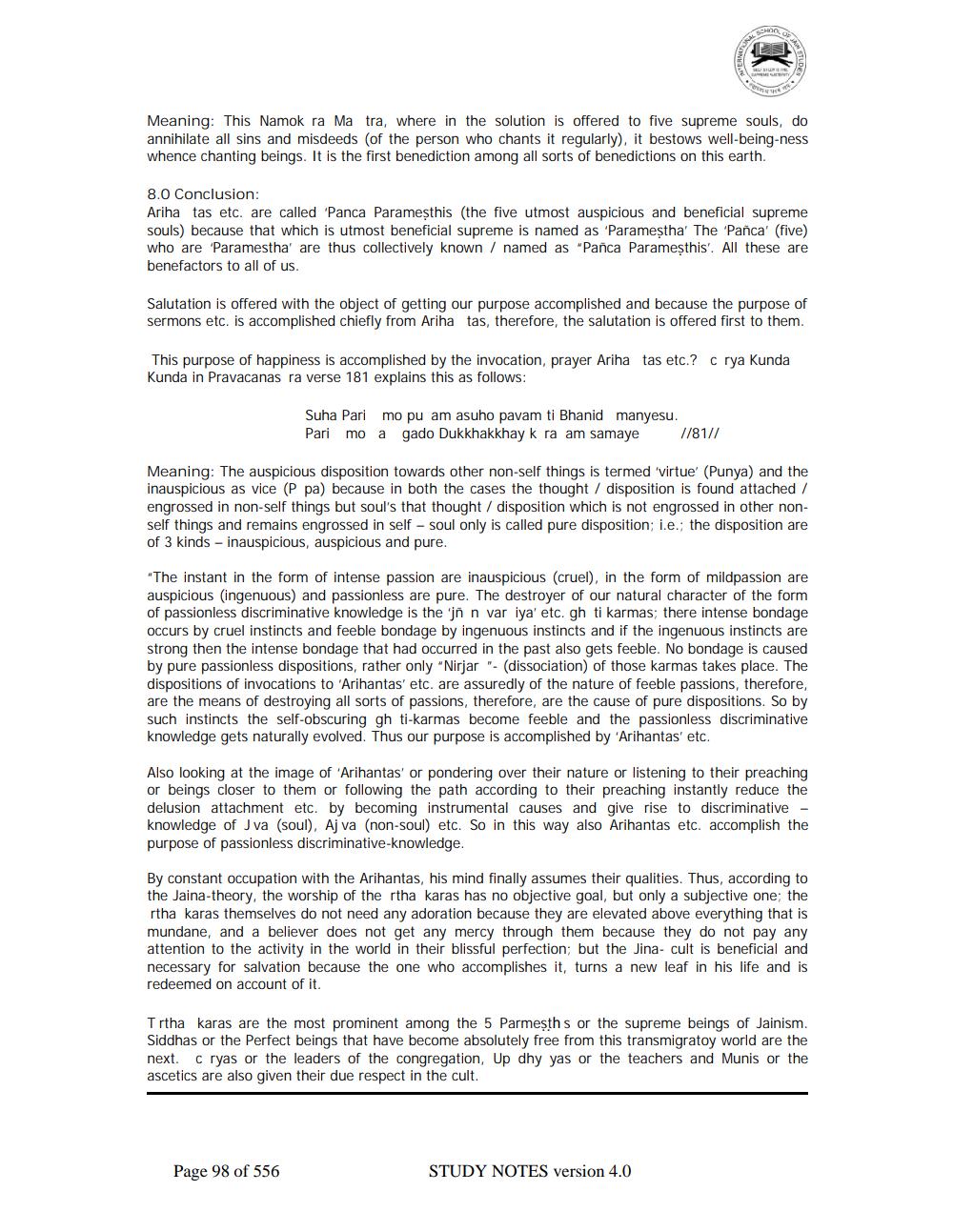________________
Meaning: This Namok ra Ma tra, where in the solution is offered to five supreme souls, do annihilate all sins and misdeeds (of the person who chants it regularly), it bestows well-being-ness whence chanting beings. It is the first benediction among all sorts of benedictions on this earth.
8.0 Conclusion:
Ariha tas etc. are called 'Panca Parameșthis (the five utmost auspicious and beneficial supreme souls) because that which is utmost beneficial supreme is named as 'Parameṣtha' The 'Pañca' (five) who are 'Paramestha' are thus collectively known / named as "Pañca Parameşthis'. All these are benefactors to all of us.
Salutation is offered with the object of getting our purpose accomplished and because the purpose of sermons etc. is accomplished chiefly from Ariha tas, therefore, the salutation is offered first to them.
This purpose of happiness is accomplished by the invocation, prayer Ariha tas etc.? c rya Kunda Kunda in Pravacanas ra verse 181 explains this as follows:
Suha Pari mo pu am asuho pavam ti Bhanid manyesu. Pari mo a gado Dukkhakkhay k ra am samaye
Meaning: The auspicious disposition towards other non-self things is termed 'virtue' (Punya) and the inauspicious as vice (P pa) because in both the cases the thought / disposition is found attached / engrossed in non-self things but soul's that thought / disposition which is not engrossed in other nonself things and remains engrossed in self - soul only is called pure disposition; i.e.; the disposition are of 3 kinds - inauspicious, auspicious and pure.
//81//
"The instant in the form of intense passion are inauspicious (cruel), in the form of mildpassion are auspicious (ingenuous) and passionless are pure. The destroyer of our natural character of the form of passionless discriminative knowledge is the 'jn n var iya' etc. gh ti karmas; there intense bondage occurs by cruel instincts and feeble bondage by ingenuous instincts and if the ingenuous instincts are strong then the intense bondage that had occurred in the past also gets feeble. No bondage is caused by pure passionless dispositions, rather only "Nirjar "- (dissociation) of those karmas takes place. The dispositions of invocations to 'Arihantas' etc. are assuredly of the nature of feeble passions, therefore, are the means of destroying all sorts of passions, therefore, are the cause of pure dispositions. So by such instincts the self-obscuring gh ti-karmas become feeble and the passionless discriminative knowledge gets naturally evolved. Thus our purpose is accomplished by 'Arihantas' etc.
Also looking at the image of 'Arihantas' or pondering over their nature or listening to their preaching or beings closer to them or following the path according to their preaching instantly reduce the delusion attachment etc. by becoming instrumental causes and give rise to discriminative - knowledge of Jva (soul), Aj va (non-soul) etc. So in this way also Arihantas etc. accomplish the purpose of passionless discriminative-knowledge.
By constant occupation with the Arihantas, his mind finally assumes their qualities. Thus, according to the Jaina-theory, the worship of the rtha karas has no objective goal, but only a subjective one; the rtha karas themselves do not need any adoration because they are elevated above everything that is mundane, and a believer does not get any mercy through them because they do not pay any attention to the activity in the world in their blissful perfection; but the Jina- cult is beneficial and necessary for salvation because the one who accomplishes it, turns a new leaf in his life and is redeemed on account of it.
Page 98 of 556
Trtha karas are the most prominent among the 5 Parmeṣths or the supreme beings of Jainism. Siddhas or the Perfect beings that have become absolutely free from this transmigratoy world are the next. c ryas or the leaders of the congregation, Up dhy yas or the teachers and Munis or the ascetics are also given their due respect in the cult.
STUDY NOTES version 4.0




